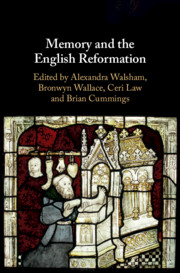Book contents
- Memory and the English Reformation
- Memory and the English Reformation
- Copyright page
- Dedication
- Contents
- Figures
- Contributors
- Preface and Acknowledgements
- Abbreviations
- Introduction
- Part I Events and Temporalities
- Part II Objects and Places
- Part III Lives and Afterlives
- Part IV Rituals and Bodies
- 19 The Wounded Missal
- 20 Gesture, Meaning and Memory in the English Reformation
- 21 Believers’ Baptism, Commemoration and Communal Identity in Revolutionary England
- 22 Making Memories in Post-Reformation English Catholic Musical Miscellanies
- 23 The Liturgical Commemoration of the English Reformation, 1534–1625
- Index
23 - The Liturgical Commemoration of the English Reformation, 1534–1625
from Part IV - Rituals and Bodies
Published online by Cambridge University Press: 30 October 2020
- Memory and the English Reformation
- Memory and the English Reformation
- Copyright page
- Dedication
- Contents
- Figures
- Contributors
- Preface and Acknowledgements
- Abbreviations
- Introduction
- Part I Events and Temporalities
- Part II Objects and Places
- Part III Lives and Afterlives
- Part IV Rituals and Bodies
- 19 The Wounded Missal
- 20 Gesture, Meaning and Memory in the English Reformation
- 21 Believers’ Baptism, Commemoration and Communal Identity in Revolutionary England
- 22 Making Memories in Post-Reformation English Catholic Musical Miscellanies
- 23 The Liturgical Commemoration of the English Reformation, 1534–1625
- Index
Summary
This chapter considers how the English Reformation was, or, mostly, was not recalled in official liturgical documents. The first section surveys the evolution of calendars of saints from the 1530s to the version that became fixed in the Book of Common Prayer from 1562 onwards, which included a great many ancient and medieval commemorations but none from later than the thirteenth century, and cites alternative commemorative models which Tudor regimes could have embraced but chose not to. It then discusses why the Book of Common Prayer so pointedly ignored the upheavals of the Reformation, unlike the Scottish Book of Common Order, arguing that this reflects the need to unite a bitterly divided nation through ‘common prayer’ which was also an act of oblivion. The final section traces how a new myth of the English Reformation was created by occasional services of national prayer during Elizabeth I’s reign, a myth in which the Reformation’s central event was Elizabeth’s own accession, providentially delivering her people from Mary Tudor’s tyranny. This myth faded from the liturgy with the queen’s death, to be replaced by a new liturgical emphasis on popish cruelty based around a new commemoration.
Information
- Type
- Chapter
- Information
- Memory and the English Reformation , pp. 422 - 438Publisher: Cambridge University PressPrint publication year: 2020
